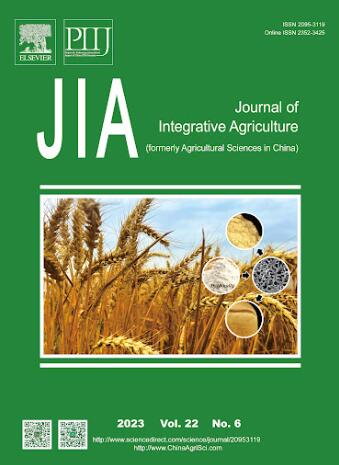对苹果(Malus×domestica Borkh.)中防御素基因的全基因组调查和体内分析表明,MdDEF25 可赋予苹果对 Fusarium solani 的抗性
IF 4.4
1区 农林科学
Q1 AGRICULTURE, MULTIDISCIPLINARY
引用次数: 0
摘要
苹果移栽病是一种复杂的土壤综合症,当同一块田地被反复用作苹果园时就会发生。原因包括不同的病原体,其中()是主要病原体。它破坏果园土壤生态系统的结构和功能,抑制苹果树的生长和发育,严重影响苹果的质量和产量。在这项研究中,我们比较了未接种()和接种()的苹果树苗的转录组。差异表达的基因主要集中在对共生真菌的反应等过程中,其中包括几种防御素。植物防御素是一种抗菌肽,但它们在感染过程中的作用仍不清楚。我们对苹果防御素基因进行了全基因组鉴定,发现25个基因具有8个半胱氨酸残基的保守基团。在野生型苹果根茎中接种了Ⅳ号基因后,根表面细胞受到严重破坏,与对照组相比,根的总长度、根的总投影面积、根尖、根叉和根的总表面积都有显著差异。亚细胞定位显示,MdDEF3-YFP 和 MdDEF25-YFP 蛋白在细胞膜上特异表达。过量表达融合蛋白可提高苹果的抗病性,为今后预防和生物防治苹果移栽病提供了新的策略。本文章由计算机程序翻译,如有差异,请以英文原文为准。
Genome-wide investigation of defensin genes in apple (Malus×domestica Borkh.) and in vivo analyses reveal that MdDEF25 confers resistance to Fusarium solani
Apple replant disease is a complex soil syndrome that occurs when the same fields are used repeatedly as apple orchards. Causes include different pathogens, with () as the main pathogen. disrupts the structure and function of the orchard soil ecosystem and inhibits the growth and development of apple trees, significantly impacting the quality and yield of apples. In this study, we compared the transcriptomes of uninoculated apple saplings with those inoculated with . The differentially expressed genes were mainly enriched in processes such as response to symbiotic fungus and included several defensins. Plant defensins are antimicrobial peptides, but their roles during infection by remain unclear. We performed a genome-wide identification of apple defensin genes and identified 25 genes with the conserved motif of eight cysteine residues. In wild-type apple rootstock inoculated with , the root surface cells experienced severe damage, and significant differences were observed in the total root length, total root projection area, root tips, root forks, and the total root surface area compared to the control group. qRT-PCR analysis revealed that and were triggered in response to infection in apples. Subcellular localization showed specific expression of MdDEF3-YFP and MdDEF25-YFP proteins at the cell membrane. Overexpressing the fusion increased resistance against in apple, providing a new strategy for the future prevention and biological control of apple replant disease.
求助全文
通过发布文献求助,成功后即可免费获取论文全文。
去求助
来源期刊

Journal of Integrative Agriculture
AGRICULTURE, MULTIDISCIPLINARY-
CiteScore
7.90
自引率
4.20%
发文量
4817
审稿时长
3-6 weeks
期刊介绍:
Journal of Integrative Agriculture publishes manuscripts in the categories of Commentary, Review, Research Article, Letter and Short Communication, focusing on the core subjects: Crop Genetics & Breeding, Germplasm Resources, Physiology, Biochemistry, Cultivation, Tillage, Plant Protection, Animal Science, Veterinary Science, Soil and Fertilization, Irrigation, Plant Nutrition, Agro-Environment & Ecology, Bio-material and Bio-energy, Food Science, Agricultural Economics and Management, Agricultural Information Science.
 求助内容:
求助内容: 应助结果提醒方式:
应助结果提醒方式:


